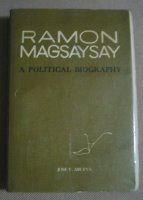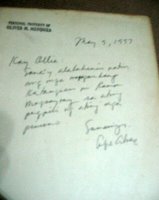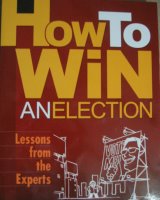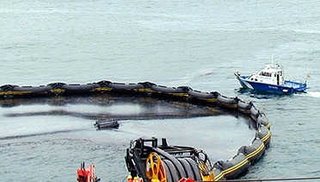It was Manolo Quezon (thru his blog) who alerted me about President Magsaysay's birth anniversary, although later he admitted that he inadvertently "advanced" by one day the former President's birthday. Which is just as well, because it prevented me from committing the same mistake (since I was already planning to write about "The Guy" he he...). So now, on the "real birthday" of President Ramon Magsaysay, I would like to share some of my thoughts on the man whom many consider as the greatest President the Philippines ever had.
One of my most treasured possessions is the book "RAMON MAGSAYSAY: A Political Biography" by Jose Abueva. I consider it one of the best-written and most comprehensive biography I have ever read about a Filipino politician. Aside from capturing the true essence of Magsaysay the man, the book also really "transports" the reader back to the political dynamics of the era. I surmise that the book, which was first published in 1971 (by Solidaridad Publishing House), secured the reputation of Professor Abueva as an important political science scholar and eminent writer. I was able to have my copy (which I bought in La Solidaridad Bookstore in Ermita) authographed by Professor Abueva (see photo below). I must have read it at least three times already and (although the photos don't really show it), the book really looks "used" and well-worn, with many side notes, dog-ears and highlighted passages all over.
secured the reputation of Professor Abueva as an important political science scholar and eminent writer. I was able to have my copy (which I bought in La Solidaridad Bookstore in Ermita) authographed by Professor Abueva (see photo below). I must have read it at least three times already and (although the photos don't really show it), the book really looks "used" and well-worn, with many side notes, dog-ears and highlighted passages all over.

Ramon Magsaysay lived through very exciting times: born when the Philippines was still an American colony, he saw everything that the Americans built razed to the ground during the Second World War. Gaining fame as a guerilla leader during the war, Magsaysay parlayed his wartime glory into a political career. His rise in politics was meteoric: a Congressman in 1946, Defense Secretary in 1950, President in 1953 - after only just seven years in politics. Truly, Magsaysay's political career is every politicians's wet dream. He defeated the Huk rebellion (with CIA assistance), inspired countless young middle-class professionals to join public service, and truly earned the love of the masa.
Allow me to share a passage from the book. Here, Magsaysay has just recently occupied Malacañang after defeating Quirino convincingly (with a little help from his CIA friends) and Abueva describes the new President's "refreshing" leadership style which is quite a radical departure from how all previous Philippine presidents governed in Malacañang.
"The President's modus operandi was marked by a refreshing informality, a restless mobility, long work hours, direct action, quick decisions, personalized attention, an irritable temper, emphasis on official honesty and zeal, the use of the military, special friendliness with the press, and a consuming effort - underlined by almost daily word and deed - to channel official and citizen interest and resources to the common people. To those who had known him well earlier, these attributes were reminiscent of his drive as defense secretary to woo back to the law the alienated peasantry of Central Luzon and thus to undercut the Huks at their base. Now, as President he would cultivate anew the people's confidence by openly identifying himself with the personal welfare of the common man. He meant to 'bring the government closer to the people.'"
Just as suddenly as when came into the political scene, Magsaysay abruptly died in a plane crash. During his funeral, former President Sergio Osmeña eulogized: "Ramon Magsaysay burst into public life like a fresh wind after a long suffocating day. He died in the night while his people, once more enjoying security and once more full of hope, peacefully slept. They woke up in the morning to discover with a shock and to grieve with a broken heart over their sudden misfortune."
****
Another book which I recently acquired (for free, compliments of the Ateneo School of Government) is "How to Win an Election: Lessons from the Experts" authored by the people behind Newsbreak Magazine. I still have to finish reading it but even now I can say that the book may well become the "Bible" of all political operatives, PR practitioners and aspiring politicians in the Philippines. Using the case study format, "How to Win Elections" reads like a "how-to-do-it-yourself" manual that even the politically uninitiated can easily understand. True to its rather straight-forward title, the book boldly attempts to "de-mystify" elections by systematically analyzing the campaigns of successful and not-so successful election candidates. People aspiring for public office will certainly find the book handy in preparing their respective campaigns. My only negative observation about the book is how they treated the "upset" victory of Isabela Governor Grace Padaca over Faustino "Jun" Dy, Jr. The Padaca article leaves one the impression that it is easy for someone with good intentions to defeat a well-entrenched (not to mention well-armed) dynasty. This misconception might prove fatal for idealistic but naive political aspirants who may try later on to tackle dynastic clans in their respective localities. The book glosses over the important fact that one of the reasons why Padaca won is because she was able to "neutralize" the goons of Dy with the help of the NPAs. In fact, contrary to public perception, it was Jun Dy (and his family) who was constantly under threat of being killed/kidnapped by the NPA during the entire campaign period in Isabela. For this reason, he could not go out and campaign as he wished. Also, on election day, the vaunted political machinery of the former Governor was totally "outclassed" by Catholic Church groups in Isabela while Dy's goons were "checked" by armed elements of the Left. Due to the threat of violence from both camps, the 2004 elections in Isabela had one of the lowest voter turn-out in the province's history. In any case, Grace Padaca deserves her title as a "Giant Killer" and should be rightly considered as a political genius. I just don't want people to have the wrong impression that Padaca's "fairy tale" victory over a well-entrenched dynasty was made possible only thru prayers, idealism and good intentions.
The book glosses over the important fact that one of the reasons why Padaca won is because she was able to "neutralize" the goons of Dy with the help of the NPAs. In fact, contrary to public perception, it was Jun Dy (and his family) who was constantly under threat of being killed/kidnapped by the NPA during the entire campaign period in Isabela. For this reason, he could not go out and campaign as he wished. Also, on election day, the vaunted political machinery of the former Governor was totally "outclassed" by Catholic Church groups in Isabela while Dy's goons were "checked" by armed elements of the Left. Due to the threat of violence from both camps, the 2004 elections in Isabela had one of the lowest voter turn-out in the province's history. In any case, Grace Padaca deserves her title as a "Giant Killer" and should be rightly considered as a political genius. I just don't want people to have the wrong impression that Padaca's "fairy tale" victory over a well-entrenched dynasty was made possible only thru prayers, idealism and good intentions.
One of my most treasured possessions is the book "RAMON MAGSAYSAY: A Political Biography" by Jose Abueva. I consider it one of the best-written and most comprehensive biography I have ever read about a Filipino politician. Aside from capturing the true essence of Magsaysay the man, the book also really "transports" the reader back to the political dynamics of the era. I surmise that the book, which was first published in 1971 (by Solidaridad Publishing House),
 secured the reputation of Professor Abueva as an important political science scholar and eminent writer. I was able to have my copy (which I bought in La Solidaridad Bookstore in Ermita) authographed by Professor Abueva (see photo below). I must have read it at least three times already and (although the photos don't really show it), the book really looks "used" and well-worn, with many side notes, dog-ears and highlighted passages all over.
secured the reputation of Professor Abueva as an important political science scholar and eminent writer. I was able to have my copy (which I bought in La Solidaridad Bookstore in Ermita) authographed by Professor Abueva (see photo below). I must have read it at least three times already and (although the photos don't really show it), the book really looks "used" and well-worn, with many side notes, dog-ears and highlighted passages all over.
Ramon Magsaysay lived through very exciting times: born when the Philippines was still an American colony, he saw everything that the Americans built razed to the ground during the Second World War. Gaining fame as a guerilla leader during the war, Magsaysay parlayed his wartime glory into a political career. His rise in politics was meteoric: a Congressman in 1946, Defense Secretary in 1950, President in 1953 - after only just seven years in politics. Truly, Magsaysay's political career is every politicians's wet dream. He defeated the Huk rebellion (with CIA assistance), inspired countless young middle-class professionals to join public service, and truly earned the love of the masa.
Allow me to share a passage from the book. Here, Magsaysay has just recently occupied Malacañang after defeating Quirino convincingly (with a little help from his CIA friends) and Abueva describes the new President's "refreshing" leadership style which is quite a radical departure from how all previous Philippine presidents governed in Malacañang.
"The President's modus operandi was marked by a refreshing informality, a restless mobility, long work hours, direct action, quick decisions, personalized attention, an irritable temper, emphasis on official honesty and zeal, the use of the military, special friendliness with the press, and a consuming effort - underlined by almost daily word and deed - to channel official and citizen interest and resources to the common people. To those who had known him well earlier, these attributes were reminiscent of his drive as defense secretary to woo back to the law the alienated peasantry of Central Luzon and thus to undercut the Huks at their base. Now, as President he would cultivate anew the people's confidence by openly identifying himself with the personal welfare of the common man. He meant to 'bring the government closer to the people.'"
Just as suddenly as when came into the political scene, Magsaysay abruptly died in a plane crash. During his funeral, former President Sergio Osmeña eulogized: "Ramon Magsaysay burst into public life like a fresh wind after a long suffocating day. He died in the night while his people, once more enjoying security and once more full of hope, peacefully slept. They woke up in the morning to discover with a shock and to grieve with a broken heart over their sudden misfortune."
****
Another book which I recently acquired (for free, compliments of the Ateneo School of Government) is "How to Win an Election: Lessons from the Experts" authored by the people behind Newsbreak Magazine. I still have to finish reading it but even now I can say that the book may well become the "Bible" of all political operatives, PR practitioners and aspiring politicians in the Philippines. Using the case study format, "How to Win Elections" reads like a "how-to-do-it-yourself" manual that even the politically uninitiated can easily understand. True to its rather straight-forward title, the book boldly attempts to "de-mystify" elections by systematically analyzing the campaigns of successful and not-so successful election candidates. People aspiring for public office will certainly find the book handy in preparing their respective campaigns. My only negative observation about the book is how they treated the "upset" victory of Isabela Governor Grace Padaca over Faustino "Jun" Dy, Jr. The Padaca article leaves one the impression that it is easy for someone with good intentions to defeat a well-entrenched (not to mention well-armed) dynasty. This misconception might prove fatal for idealistic but naive political aspirants who may try later on to tackle dynastic clans in their respective localities.
 The book glosses over the important fact that one of the reasons why Padaca won is because she was able to "neutralize" the goons of Dy with the help of the NPAs. In fact, contrary to public perception, it was Jun Dy (and his family) who was constantly under threat of being killed/kidnapped by the NPA during the entire campaign period in Isabela. For this reason, he could not go out and campaign as he wished. Also, on election day, the vaunted political machinery of the former Governor was totally "outclassed" by Catholic Church groups in Isabela while Dy's goons were "checked" by armed elements of the Left. Due to the threat of violence from both camps, the 2004 elections in Isabela had one of the lowest voter turn-out in the province's history. In any case, Grace Padaca deserves her title as a "Giant Killer" and should be rightly considered as a political genius. I just don't want people to have the wrong impression that Padaca's "fairy tale" victory over a well-entrenched dynasty was made possible only thru prayers, idealism and good intentions.
The book glosses over the important fact that one of the reasons why Padaca won is because she was able to "neutralize" the goons of Dy with the help of the NPAs. In fact, contrary to public perception, it was Jun Dy (and his family) who was constantly under threat of being killed/kidnapped by the NPA during the entire campaign period in Isabela. For this reason, he could not go out and campaign as he wished. Also, on election day, the vaunted political machinery of the former Governor was totally "outclassed" by Catholic Church groups in Isabela while Dy's goons were "checked" by armed elements of the Left. Due to the threat of violence from both camps, the 2004 elections in Isabela had one of the lowest voter turn-out in the province's history. In any case, Grace Padaca deserves her title as a "Giant Killer" and should be rightly considered as a political genius. I just don't want people to have the wrong impression that Padaca's "fairy tale" victory over a well-entrenched dynasty was made possible only thru prayers, idealism and good intentions.





